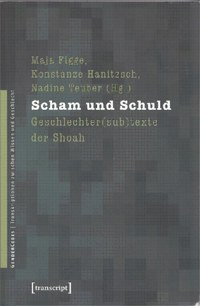Gender Codes of Shame and Guilt: Correlations and Consequences on the Part of Nazi Perpetrators and Their Descendants
DOI:
https://doi.org/10.22029/ko.2012.650Abstract
Avowals of shame and guilt play a major role in contemporary discourses of remembrances of national socialist crimes. Furthermore, they represent an extensive interpretation pool of German guilt (cf. p. 9). For the differentiation of this pool, the interdisciplinary anthology Scham und Schuld. Geschlechter(sub)texte der Shoah (Shame and Guilt. Gender (Sub)Texts of the Shoah) published by Maja Figge, Konstanze Hanitzsch, and Nadine Teuber discusses whether shame and guilt have been disseminated to the second and third generations of NS perpetrators, as well as the significance of these emotions in the remembrance of and political debate about national socialist crimes (cf. p. 9). Therefore, it is the subtexts of avowals of shame and guilt that dominate in all 14 articles. Despite the diversity of perspectives the premise is proved that a specific gender codification of shame and guilt provokes a discharge, a cover up, and a mystification of the Shoah (cf. p. 10).
References

Downloads
Published
Issue
Section
License
All articles (not book covers) in KULT_online from issue 50 on are published under the license Creative Commons Attribution 4.0. All published articles may be reused under the conditions of the license, particularly for commercial purposes and through editing the article (Human-Readable Summary). All authors (have) permitted the publication under the above mentioned license. There is no copyright transfer towards KULT_online. For all book covers specific rights might be reserved, please contact the respective publisher for any lawful reuse. All contributions published in issue 1-49 of KULT_online are free available online and protected by the German Copyright Law.



